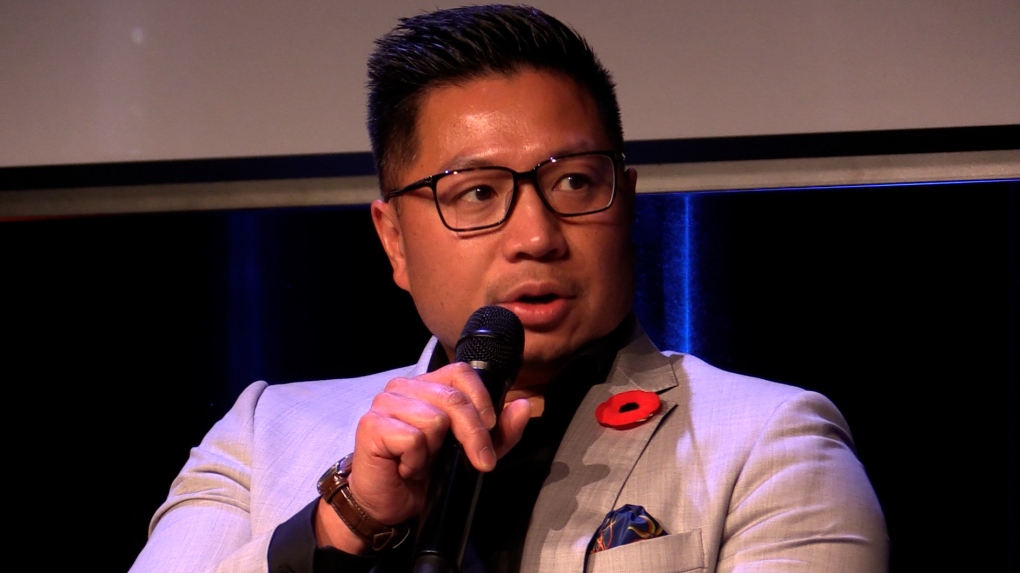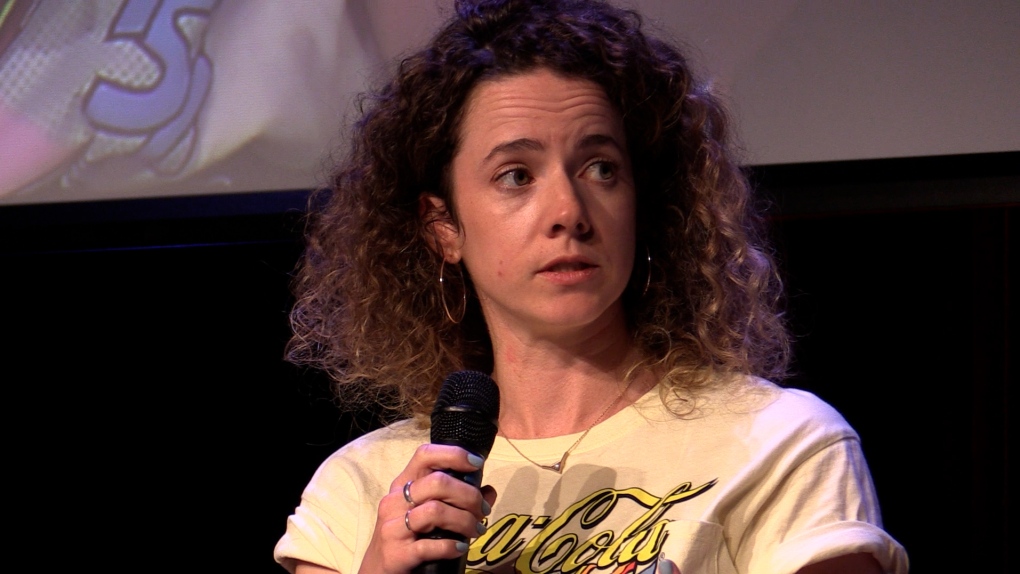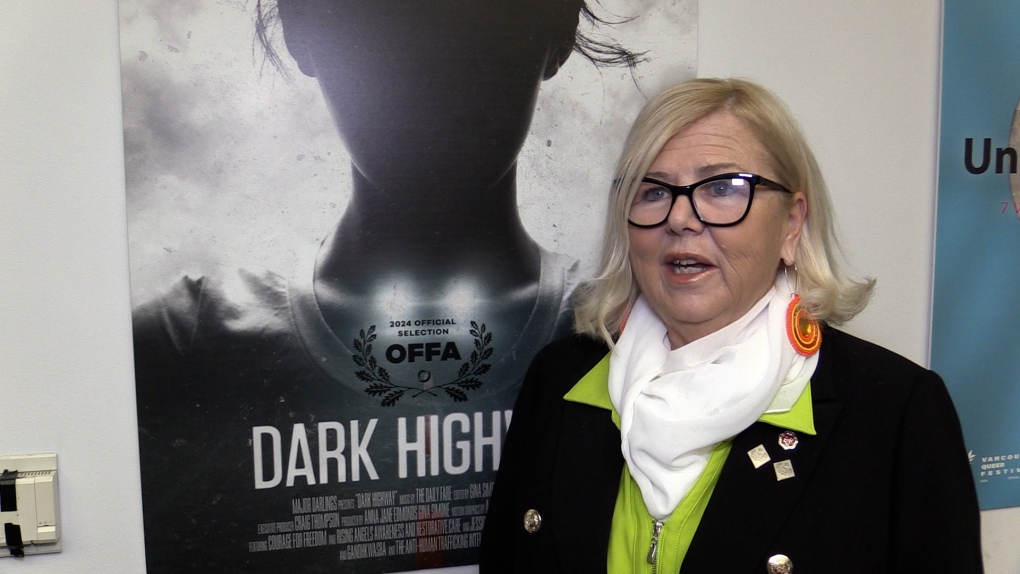'Stop buying our kids': London police looking to increase capacity of Human Trafficking Unit
As a documentary at Forest City Film Festival (FCFF) brought survivors of human trafficking to the big screen, London’s police chief said combatting the crime is a “big priority for us.”
Chief Thai Truong of the London Police Service (LPS) was part of a panel discussion following the screening of Dark Highway at FCFF. Truong said trafficking is a “big problem” because “there is a lot of money to be made.”
He emphasized that the majority of cases in Canada are happening in London and the GTA along the 401 corridor.
“We are laying human trafficking charges and our human trafficking unit is doing incredible work,” Truong told CTV News. “They're combating pimps, traffickers that are operating in this space and if you don't devote resources and priority to this crime, it goes undetected.”
 London Police Chief Thai Truong speaks about human trafficking on a panel after the airing of the film Dark Highway at the Forest City Film Festival, October 29, 2024 (Brent Lale/CTV News London)
London Police Chief Thai Truong speaks about human trafficking on a panel after the airing of the film Dark Highway at the Forest City Film Festival, October 29, 2024 (Brent Lale/CTV News London)
That’s why as part of the upcoming multi-year budget, LPS is looking to increase capacity of its human trafficking unit.
“It’s providing expertise and specialized training to not just human trafficking investigators specifically but providing a generalist perspective where we're adding special officers with this training. It is increasing the capacity overall as an organization. That is something that this organization has not done to this level, but that is part of the plan for the next four years over the four-year budget process.”
The film Dark Highway, directed and produced by Western University grad AJ Edmonds started out as a short film, but turned into a full-length documentary once she started collecting first-hand accounts from survivors.
“When I was brought into it, I had no idea that this crime existed around me,” said Edmonds. “I had no idea how prevalent the crime of human trafficking was here, and once I knew, I couldn't look away.”
An eye-opening line in the film is when Edmonds describes commuting on the 401.
 AJ Edmonds, director and producer of the film Dark Highway speaks about human trafficking on a panel after the airing of the film at the Forest City Film Festival (Brent Lale/CTV News London)
AJ Edmonds, director and producer of the film Dark Highway speaks about human trafficking on a panel after the airing of the film at the Forest City Film Festival (Brent Lale/CTV News London)
“If you drive the 401 you are more than likely passing someone who is driving it unwillingly. That is being moved from jurisdiction to jurisdiction against their will, because human trafficking happens here.”
The powerful stories are something Edmonds wants people to use to start to engage in conversation.
“If all you take away is going home and looking at a family member and going, did you know that this happens?” said Edmonds. “Did you know the average age of a survivor, or a victim is 13 or eight for indigenous children? That is usually enough for someone that had no idea.”
One of the survivors in the film is Kelly Tallon Franklin. She was trafficked in the 1980’s and now runs ‘Courage for Freedom,’ which offers education and advocacy along with support programs for fellow survivors.
Their website states they have a mission to eradicate the human trafficking and sexual exploitation of girls, boys and children.
“Stop buying our kids,” said Franklin, who said she’s helped support over 900 minors in exiting the trade.
According to Franklin, there are many long held misconceptions about what trafficking actually looks like.
“Liam Neeson (in reference to the movie Taken) does not live in our community,” she said. “The myths that have to do with snatch and grab, that's usually somebody that's already been trafficked and tried to exit. They could start out as a boyfriend or a friend or somebody that's going to give them a job or help them. If the criminal doesn’t already have something that puts somebody at risk, the traffickers will create the risk in somebody's life so they could start out as a boyfriend or a friend or somebody that's going to give them a job or help them.”
 Kelly Tallon Franklin, a human trafficking survivor speaks to CTV London after appearing in the film Dark Highway, October 29, 2024 (Brent Lale/CTV News London)
Kelly Tallon Franklin, a human trafficking survivor speaks to CTV London after appearing in the film Dark Highway, October 29, 2024 (Brent Lale/CTV News London)
She said there is family trafficking, trafficking by women on girls, and teenagers that are recruiting each other.
“At the end of the day, it's about money,” said Franklin.
“The statistics are highly skewed because it's an underreported crime. We do know that since COVID, we've had over a 48% increase”.
Chief Truong – who prior to earning the job as London’s top cop, led units on different forms of trafficking – said it’s a group effort to not only identify the different levels of trafficking, but to step in.
“I would say if it doesn't look right, do something,” said Truong. “Do something could simply mean making sure you're taking note of what that girl looks like, what that individual looks like, obtaining as much information as you can and reporting it.”
CTVNews.ca Top Stories

BREAKING Prime Minister Trudeau to meet Donald Trump at Mar-a-Lago
Prime Minister Justin Trudeau has landed in West Palm Beach, Fla., on Friday evening to meet with U.S.-president elect Donald Trump, sources confirm to CTV News.
'Mayday! Mayday! Mayday!': Details emerge in Boeing 737 incident at Montreal airport
New details suggest that there were communication issues between the pilots of a charter flight and the control tower at Montreal's Mirabel airport when a Boeing 737 made an emergency landing on Wednesday.
Hit man offered $100,000 to kill Montreal crime reporter covering his trial
Political leaders and press freedom groups on Friday were left shell-shocked after Montreal news outlet La Presse revealed that a hit man had offered $100,000 to have one of its crime reporters assassinated.
Cucumbers sold in Ontario, other provinces recalled over possible salmonella contamination
A U.S. company is recalling cucumbers sold in Ontario and other Canadian provinces due to possible salmonella contamination.
John Herdman resigns as head coach of Toronto FC
John Herdman, embroiled in the drone-spying scandal that has dogged Canada Soccer, has resigned as coach of Toronto FC.
Musk joins Trump and family for Thanksgiving at Mar-a-Lago
Elon Musk had a seat at the family table for Thanksgiving dinner at Mar-a-Lago, joining President-elect Donald Trump, Melania Trump and their 18-year-old son.
Billboard apologizes to Taylor Swift for video snafu
Billboard put together a video of some of Swift’s achievements and used a clip from Kanye West’s music video for the song “Famous.”
Trudeau says no question Trump is serious on tariff threat
Prime Minister Justin Trudeau says incoming U.S. president Donald Trump's threats on tariffs should be taken seriously.
In a shock offensive, insurgents breach Syria's largest city for the first time since 2016
Insurgents breached Syria's largest city Friday and clashed with government forces for the first time since 2016, according to a war monitor and fighters, in a surprise attack that sent residents fleeing and added fresh uncertainty to a region reeling from multiple wars.


































